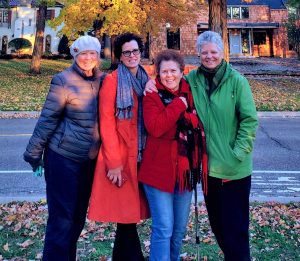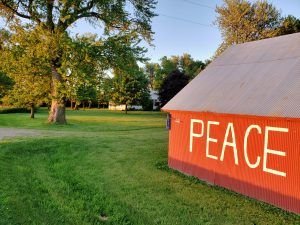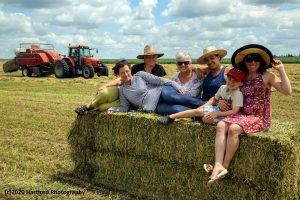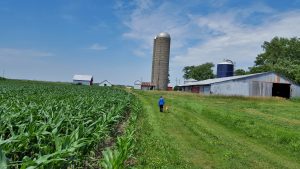Honoring Land and Family
The Bouska sisters put relationships first as they plan for their farm’s future
When the Bouska sisters inherited their family farm in 2009, after their father Edward’s death, they became joint owners of the 450-acre farm they grew up on near Protivin, in northeastern Iowa. But they also inherited their parents’ legacy of proactive planning, community-mindedness and working together toward shared goals.
As farmland owners, the sisters – Sally McCoy, of Edgerton, Wisconsin; Ann Novak, of Burlington, Washington; Peg Bouska, of Iowa City; and Carol Bouska, of Minneapolis – are now modeling the same kind of thoughtful leadership as they work together to plan for the future of their family land.
Since their mother Elmarie’s death in 2011, the sisters have taken increasingly deliberate steps to map out their vision for the farm – setting goals, writing farm legacy letters, meeting regularly, attending conferences and consulting experts – while creating space for sometimes difficult emotional dynamics and differences of opinion to be navigated with love and compassion. They have also progressively increased conservation practices on the land, and recently made the bold commitment to convert the farm to a regenerative agriculture system within 10 years.
This exemplary approach to farm legacy planning, as well as the sisters’ efforts to manage their land with long-term sustainability in mind, led to their selection by Practical Farmers’ board of directors as the 2020 recipients of the Farmland Owner Legacy Award, which will be presented during a virtual ceremony on Oct. 20.
Practical Farmers of Iowa grants this award annually to landowners who use their land to help the next generation get started, advance land stewardship and promote long-term sustainability of farm businesses, environmental quality and rural communities. The award highlights the important role non-operator farmland owners can play in the future success of sustainable agriculture.
“Our parents really set the tone for getting along,” Peg says. “They worked hard to improve their community, and in their way, were movers and shakers. We think they would be really proud of us right now.”

From left to right: Ann Novak, Carol Bouska, Sally McCoy and Peg Bouska pose by a brilliantly hued autumn tree during the Women in Sustainable Agriculture conference, which took place in October 2019 in Minneapolis.
Farm With a Dark-Sky View
The Bouska sisters and their two other siblings, Jack and Mary Jane, who both sadly died, grew up on Highland Farm – a relatively flat piece of land about 30 miles south of the Minnesota border that sits on the cusp of Iowa’s Driftless Region. Their father, who was born on the farm and died there, planted many trees that now confer lush shade, as well as wildlife habitat in dense thickets along the property’s edges.
But the vista still feels vast and inspiring, Peg says, with dark, star-filled skies and a view that “allows one to see the beauty of sunset and sunrise, and watch the weather move through. The Milky Way is always bright there.” In July, she and Carol visited the farm and saw comet Neowise, newly discovered just in March, as it streaked into the depths of the solar system on its 6,800-year orbit around Earth.
The sisters’ memories of their childhoods on the farm are just as vivid, and as deep. From summers spent running barefoot, to the rich silence of a land with few cars to mar the sounds of nature, to the sweet smell of clothes suffused with smoke from nights spent around campfires singing and telling stories – the farm left deep imprints that now guide the sisters as they seek, as farmland owners, to honor the land that shaped them as people.
“I learned a lot during those campfire sessions,” says Carol, at 59, the youngest of the six siblings, “about what people were thinking, about what was going on in the world, about memories. I still enjoy the fires we have when we all gather.”
“The farm has a sacredness about it,” Peg says. “We love being there. It’s like a haven.”
For many years, the farm was extremely diverse, with corn, soybeans, oats and hay, as well as cattle, hogs, chickens, a quarter horse and an ever-present cast of farm cats and dogs. Their mother also kept a large garden that, with the livestock raised on the farm, helped the family live a mostly self-sustaining lifestyle. Sally recalls the farm as “a place of hospitality,” where neighbors were welcome, and grandparents and cousins would come from near and far to enjoy the land or share the toil of tasks like butchering chickens.
As he got older, Ed pared down the enterprises on the farm. In his 60s, with none of the Bouska children planning to take over, he rented the farm to a tenant, Tom, who still farms the land – now with his daughter – raising corn, soybeans and alfalfa, and whom the Bouska sisters have involved in their farmland planning process.
Nurtured by Family and Farm
The busyness of farm life meant there were always farm chores. Everyone helped, and the sisters all recall having important roles to play, always encouraged by their parents. Elmarie – who lived on the farm for 70 years and also died there – was an important role model, driving the tractor, offering mechanical expertise and managing the raising and selling of 500 chickens.
“Farmers are kind of private people, and it’s really hard to talk about farm legacy planning because you’re planning your death, basically. It requires one to be brave and to think deeply.” – Carol Bouska
“Doing things that were challenging attracted me, like driving machinery or farrowing hogs,” says Sally, 74, and the eldest of the four sisters. “I loved the feeling that I was contributing. Though many times we hated to be pressed into work, like herding cattle that escaped at 2 a.m., we still had a sense that we were essential to the operation.”
“We learned to work, be responsible and pitch in as a team and family,” adds Ann, who recently turned 70. Peg, 64, was especially active with farm work, helping with a range of chores as her father got older, from cultivating crops to driving the tractor and operating machinery. “Dad needed help and I enjoyed it,” Peg says. “But he was very encouraging of us females to do whatever we wanted.”
Their parents’ support influenced all the Bouska children to follow their talents and interests to college and careers off the farm. Ed and Elmarie also set a sterling example of what it looks like to truly invest in one’s community. “They were 4-H leaders, and started a card club in the neighborhood that went for 30 years,” Peg says. “With others, they started a community theater. Mom was on the mental health board, and during the farm crisis, they were especially active in peer counselling.” A fine baker, Elmarie also taught a bread-baking class through the local high school’s community education program.
Many of the careers the siblings staked out mirror the ethos of community service their parents fostered. Sally got a doctorate in child psychology and worked in the field for over 40 years, and was founding member of a grassroots volunteer organization devoted to children’s mental health. Ann spent 25 years as a child and family therapist, then went back to school to study environmental science and worked with a salmon fisheries enhancement group before starting an organic vegetable farm on 10 acres 60 miles north of Seattle. “We now are leasing to three sets of young farmers who cannot afford their own land at this time,” she says, “and consider this a form of incubation for their future and dreams.”
Peg works as a physician’s assistant, has worked in family practice and previously worked with a mobile clinic that traveled to farmworker camps to provide basic healthcare. Before COVID-19, she also volunteered widely in her community. Carol became an engineer specializing in process improvement and worked with 3M for many years before starting her own consulting business in Minneapolis. Like the other Bouska siblings, she also volunteers extensively – and she helped raise her niece, Tess, now 37, after her mother, Mary Jane, died in an accident when she was 9 years old.
These collective professional backgrounds – combined with their parents’ proactive planning for death; their close-knit upbringing; and their shared experience of family loss and tragedy – have helped the Bouska sisters successfully navigate the difficult emotional dimensions of planning for their farm’s future.
“Dad was talking about dying when he was 60,” Carol says, “so we had good role modeling.”
“I believe many families have difficulty with these issues of land ownership and legacy. It requires working through feelings of family history and individual differences,” Ann says. “There is joy and pain in the process. Focusing on compassion and respect has helped bind us as a unit.”

Trees planted by Ed Bouska create lush shade, as the golden light of sunset shines on the house and a machine shed on which Ed painted the word “PEACE” in March 2003, just before the U.S. went to war with Iraq. “We just love it,” Peg says.
First Steps as Farmland Owners
In 2013, the Bouska sisters and their brother Jack, who also was a joint owner, decided to incorporate the farm into an LLP, with each sibling owning a share. In 2014, Jack died suddenly. As outlined in the partnership agreement, the sisters bought out Jack’s share. “We were so grateful we had put that in place,” Peg says. “We feel like he had some knowledge that his wishes were incorporated into that document.”
The sudden loss also catalyzed their farm visioning process. Before Jack’s death, the siblings had started talking with Tom about the possibility of planting a pollinator field in a small 9-acre area adjacent to a wetland that was not convenient for Tom to farm. A few months before his death, Jack had been keenly researching the idea and seeking advice from someone at Pheasants Forever. “His wife said he was so excited about it, and talked about it a lot,” Peg says.
The following spring, the Bouska sisters pressed forward with the pollinator planting, naming the field “Jack’s Field” in their brother’s honor, and putting some of his ashes there. In 2017, they added two more pollinator fields, 5 acres each, named after their parents. The sisters also started meeting and discussing farm business more regularly. “When we started doing that,” Peg says, “it just accelerated our process.”
In 2014, Peg attended Practical Farmers’ inaugural performance of the play “Map of My Kingdom,” which explores the many thorny and emotional facets of farmland transfer. That’s how she learned about PFI and got connected with Teresa Opheim, PFI’s former executive director. In 2016, the Bouska sisters gathered at the farm with the singular purpose of mapping out their goals for the future of the farm.
Four shared goals emerged from that meeting: 1). Use the farm to stem farm consolidation; 2). Improve soil, water quality and biodiversity; 3). Keep family harmony; and 4). Provide safe and healthy food.
“We were raised in a mindset of conservation, stewardship and love of nature,” Ann says. “My sister partners and I were all concerned about international buyouts of Iowa farmland, CAFOs increasing in our area and land consolidation. This would also mean the decline of the local community, small towns and rural quality of life.”
Maintaining family harmony has been central to the process – to honor their parents’ wishes and example; to work through long-standing sororal dynamics; and to serve as role models for the next generation. With a 19-year age spread between Jack, the oldest, and Carol, the youngest, listening and reaching consensus are essential to how they work together.
“Those roles of big sister, little sister – those have to be worked through as well when you’re adults,” Peg adds, “because those run deep.”
“We vote, but we also talk through things and explain our concerns,” Carol says. “If somebody feels left out, we try to address that. It takes time and effort, but I believe that in the end, we are leaving our healthy partnership as part of our legacy also.”

From left to right: Peg Bouska (with straw hat), Carol Bouska (lying down), Ann Novak, Tess Bouska, Owen McCoy-Young and Kate McCoy gather on a hay bale on the Bouska farm. Driving the tractor is Roger Kramer. Photo by Larry Hartford of Hartford Photography, all rights reserved.
Committing to Climate-Friendly Ag
As the sisters started gathering more regularly, the farmland visioning process gained momentum. In 2017, each sister drafted a farmland legacy letter, capturing treasured memories and personal hopes for the land’s future. Knowing that sharing their letters with one another would trigger deep emotions, they reserved a room for it at the Decorah library. “It was the first time we said this is important, because we need space and privacy,” Peg says. “It was kind of a start to us being more formal about [farmland ownership] being a business.”
Afterwards, the sisters went swimming together, a tactic – planning a group fun activity after the business ends – they intentionally weave into all their meetings. “It’s really, really important to have that relief of fun,” Sally says. “We have a very strong ethic of doing the work, then having fun. That contrast between working hard but also enjoying yourself has really cemented our connection.”
The big turning point in the sisters’ farmland visioning, when they decided to convert the farm to a regenerative system, was in October 2019, when they all attended a Women in Sustainable Agriculture conference, organized by MOSES, in Minneapolis. Previously, the sisters had opted to spread out the task of knowledge acquisition by attending conferences separately, or tackling topics on their own, sharing what they learned with everyone later. This time, they decided to attend the conference as a group.
“We have a very strong ethic of doing the work, then having fun. That contrast between working hard but also enjoying yourself has really cemented our connection.” – Sally McCoy
They had hired Rena Striegel, president of Des Moines-based Transition Point Business Advisors, to lead them in two half-day farmland planning sessions over a weekend. Before the first session with Rena, they attended a regenerative agriculture workshop at the WISA conference led by Lindsey Rebhan and Paula Westmoreland of Ecological Design. “It was transformative,” Peg says of the workshop. “It was a four-hour intensive, and it was one of those beautiful fall weekends. It was kind of like things just clicked for all of us.”
The timing couldn’t have been better. The sisters carried their renewed sense of purpose into their session with Rena, who encouraged them to think big, guided them through some hurt feelings and helped them refine their vision. Peg says Rena also gave them confidence that they were much further along than they realized, both emotionally and in having a shared vision.
“We got so much done – but she kept nudging us,” Peg says. “She kept us thinking of what’s possible, focusing on the higher-level vision.”
The sisters have since hired Ecological Design, a women-owned firm, to help them transition their farm from conventional row crops to a system with diverse plants and animals that keeps soil covered year-round. Earlier this summer, they took another big leap, becoming part of the Climate Land Leaders initiative of the Minnesota-based Main Street Project, which Teresa Opheim now directs.
“As part of the initiative, the sisters will be implementing a stretch goal to implement climate-friendly agriculture on their land,” explains Teresa, who will present the Farmland Owner Legacy Award to the sisters during the ceremony. “We need more farmland owners like the Bouska sisters, who put family relationships first and are deeply committed to conservation while working with their existing tenant.”
Advice to Others
For their part, the sisters are excited about what the future holds. While they acknowledge they have many questions still to work through – not least, how to transition the farm – they feel closer as sisters, and energized knowing they can use their hallowed ground to care for the land, embody their values and honor their heritage. The sisters advise other families facing a farmland transition to not wait, seek out resources and people who can help, find shared goals, treat the process as a business and recognize it takes time. Above all, they urge others not to wait until death or tragedy forces a decision.
“Don’t leave the decision about land until a funeral forces it,” Sally says. “That’s a time when people are grieving and stressed, not making their most logical or wise choices.”
“Farmers are kind of private people, and it’s really hard to talk about farm legacy planning because you’re planning your death, basically,” Carol says. “It requires one to be brave and to think deeply. But it is also so rewarding to know that when I leave this planet, I will not be leaving a lot of unresolved issues for the next generation to deal with.
“I personally went in a year’s time from feeling really sad about the farm, and what’s going to happen after us, to feeling really excited and energized about what we can do in our lifetime – and that’s given me purpose.”

